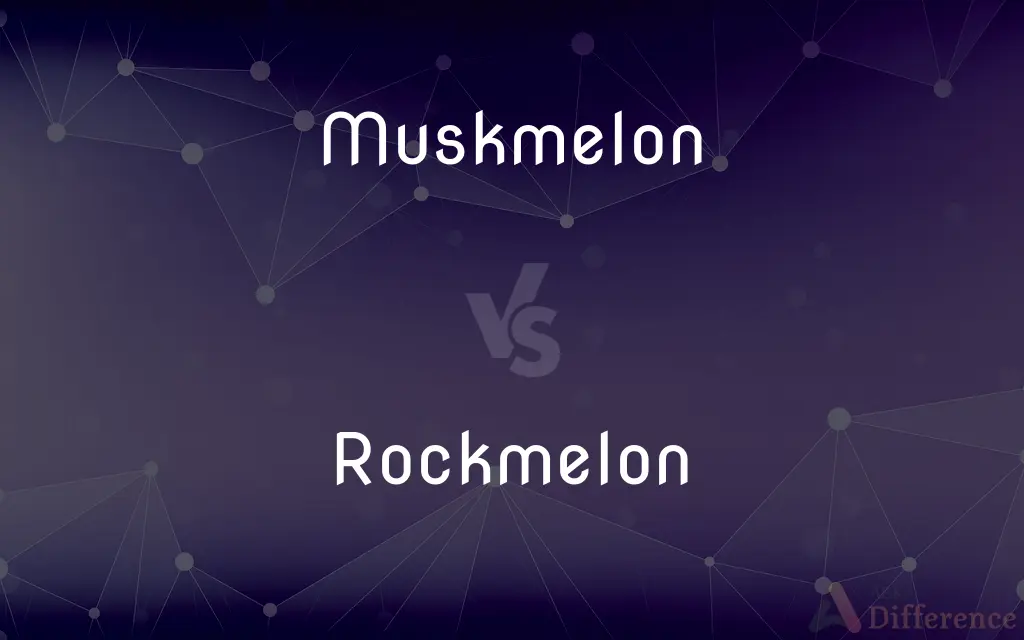Muskmelon vs. Rockmelon — What's the Difference?
Edited by Tayyaba Rehman — By Urooj Arif — Updated on April 17, 2024
Muskmelon, known for its sweet and juicy flavor, is commonly referred to as cantaloupe in the U.S., while rockmelon, another term for the same fruit, is primarily used in Australia and New Zealand.

Difference Between Muskmelon and Rockmelon
Table of Contents
ADVERTISEMENT
Key Differences
Muskmelon, a member of the Cucurbitaceae family, is celebrated for its netted, tan rind and sweet orange flesh. In contrast, rockmelon refers to the same fruit but emphasizes regional naming differences, primarily used in Australia.
While muskmelon thrives in warm, temperate climates, providing a peak season in summer, rockmelon experiences similar growing conditions and seasonal peaks, reflecting global cultivation practices.
Muskmelon is rich in vitamins A and C, which are essential for immune health and vision. Rockmelon, equally nutritious, offers the same health benefits, making it a popular choice for a healthy diet.
In culinary uses, muskmelon is often eaten fresh, added to salads, or blended into smoothies. Meanwhile, rockmelon is used similarly in regions where it is more commonly known, enjoying the same versatility in dishes.
The fragrance of muskmelon is distinctly sweet and musky, a characteristic that makes it a favorite in perfumes and aromatherapy. Rockmelon shares this aromatic profile, contributing similarly to various scented products.
ADVERTISEMENT
Comparison Chart
Terminology
Often called cantaloupe in North America
Commonly known as rockmelon in Oceania
Origin of Name
From the musky aroma and melon type
From the rock-like texture of the rind
Nutritional Value
High in vitamins A and C, fiber
Identical nutritional profile
Culinary Uses
Eaten fresh, in salads, smoothies
Used similarly in diverse dishes
Aromatic Characteristics
Sweet, musky fragrance
Same fragrance, popular in aromatics
Compare with Definitions
Muskmelon
Often used in smoothies and salads.
He blended muskmelon into his morning smoothie.
Rockmelon
Another name for muskmelon, especially in Australia.
She served fresh rockmelon at the picnic.
Muskmelon
A type of melon with a netted rind and sweet, orange flesh.
I enjoyed a refreshing slice of muskmelon on a hot day.
Rockmelon
Commonly included in Australian and New Zealander fruit salads.
Rockmelon is a staple in his fruit salad recipe.
Muskmelon
Known for its high vitamin A and C content.
She added muskmelon to her diet for its health benefits.
Rockmelon
Cultivated under similar conditions as muskmelon.
Rockmelon thrives in their garden during the warm months.
Muskmelon
Used in aromatherapy for its sweet, musky aroma.
The spa used muskmelon scent for a relaxing atmosphere.
Rockmelon
Provides the same nutritional benefits as muskmelon.
Adding rockmelon to your diet can boost your vitamin intake.
Muskmelon
Grown primarily in temperate regions during warm seasons.
They planted muskmelon in their backyard as summer approached.
Rockmelon
A popular choice for natural fragrance oils.
The natural oil diffuser used rockmelon essence.
Muskmelon
Any of several varieties of the melon Cucumis melo, such as the cantaloupe, having fruit characterized by a netted rind and edible flesh with a musky aroma.
Rockmelon
A type of melon, Cucumis melo var. reticulatus, with sweet orange flesh and a rough skin resembling netting.
Muskmelon
The fruit of any of these plants.
Muskmelon
A type of melon, Cucumis melo subsp. melo, with sweet orange flesh and a rough skin resembling netting.
Muskmelon
The fruit of a cucurbitaceous plant (Cucumis Melo) of the gourd family, having a peculiar aromatic flavor, and cultivated in many varieties, the principal sorts being the cantaloupe, of oval form and yellowish flesh, and the smaller nutmeg melon with greenish flesh. See Illust. of Melon.
Muskmelon
Any of several varieties of vine whose fruit has a netted rind and edible flesh and a musky smell
Muskmelon
The fruit of a muskmelon vine; any of several sweet melons related to cucumbers
Common Curiosities
What is rockmelon?
Rockmelon is another term for muskmelon, predominantly used in Australia and New Zealand.
What are the health benefits of rockmelon?
Rockmelon, like muskmelon, is rich in vitamins A and C, which are beneficial for health.
Can rockmelon be cooked?
While typically eaten fresh, rockmelon can also be grilled or added to cooked dishes.
Are muskmelon and rockmelon the same?
Yes, muskmelon and rockmelon refer to the same fruit, differing only in regional terminology.
How can I use muskmelon in cooking?
Muskmelon is versatile and can be used fresh in salads, blended into smoothies, or as a snack.
Where is muskmelon commonly grown?
Muskmelon is commonly grown in temperate regions during the warm months.
What does rockmelon taste like?
Rockmelon has a sweet, juicy flavor similar to muskmelon.
What is muskmelon?
Muskmelon is a type of sweet melon known for its netted rind and orange flesh, commonly called cantaloupe in the U.S.
Is muskmelon good for weight loss?
Yes, muskmelon is low in calories and high in fiber, making it suitable for weight loss diets.
How do you select a ripe rockmelon?
A ripe rockmelon will have a fragrant smell at the blossom end and a slightly soft base.
Can I grow muskmelon at home?
Yes, with suitable climate conditions, muskmelon can be grown in home gardens.
What dishes are enhanced by adding rockmelon?
Rockmelon enhances fruit salads, desserts, and can be paired with savory dishes.
What are the aromatic uses of muskmelon?
Muskmelon's sweet fragrance is used in perfumes and aromatherapy products.
Is rockmelon available worldwide?
While available globally, rockmelon is more commonly known in specific regions like Australia and New Zealand.
What is the peak season for muskmelon?
The peak season for muskmelon is during the summer months.
Share Your Discovery

Previous Comparison
Element vs. Component
Next Comparison
Boil vs. BroilAuthor Spotlight
Written by
Urooj ArifUrooj is a skilled content writer at Ask Difference, known for her exceptional ability to simplify complex topics into engaging and informative content. With a passion for research and a flair for clear, concise writing, she consistently delivers articles that resonate with our diverse audience.
Edited by
Tayyaba RehmanTayyaba Rehman is a distinguished writer, currently serving as a primary contributor to askdifference.com. As a researcher in semantics and etymology, Tayyaba's passion for the complexity of languages and their distinctions has found a perfect home on the platform. Tayyaba delves into the intricacies of language, distinguishing between commonly confused words and phrases, thereby providing clarity for readers worldwide.














































